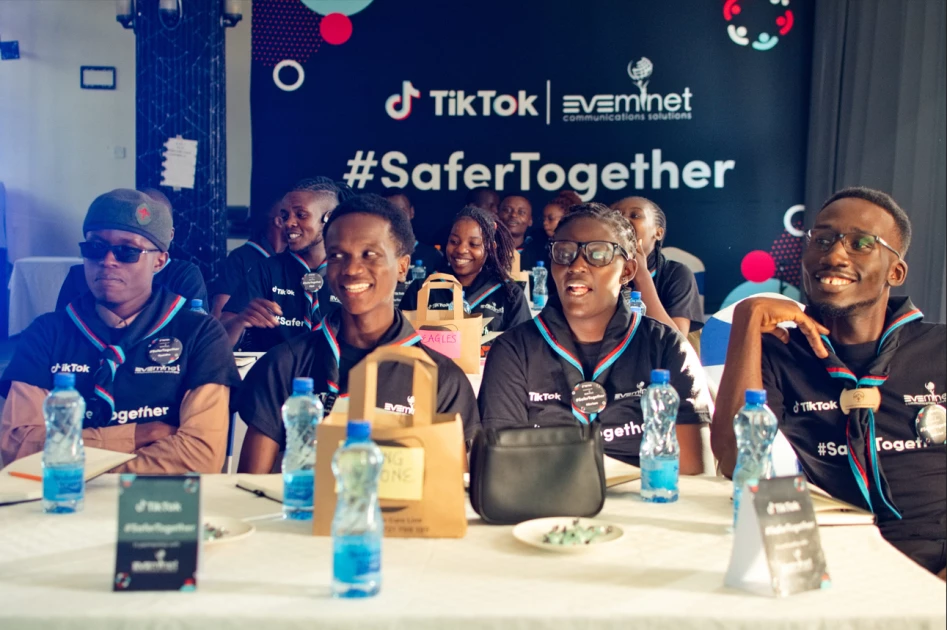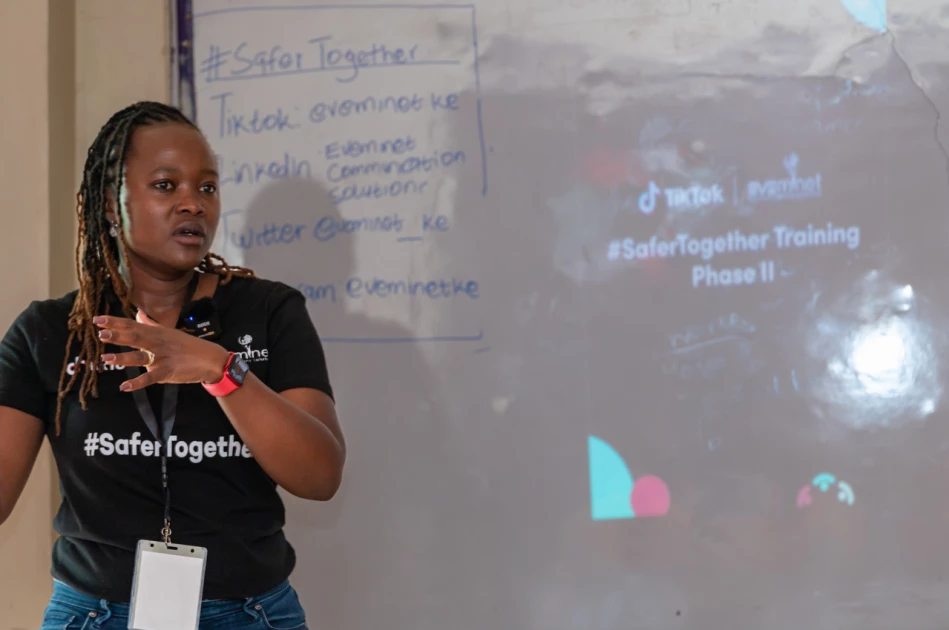sponsored content
How TikTok’s #SaferTogether campaign is transforming online safety in Kenya #AD

A #SaferTogether Trainer of Trainer (ToT) training session in the Western Region.

Audio By Vocalize
In today’s fast-evolving digital landscape, online
safety has become a shared responsibility—one that calls for collective action
from all corners of society. That is why in 2023 TikTok launched the
#SaferTogether Initiative, a community-driven, collaborative initiative
designed to unite various stakeholders such as governments, civil society
groups, creators and the wider community in promoting safety on TikTok. Safety
is a shared responsibility, and this campaign encourages everyone to do their
part. From in-app activities to out-of-app workshops, #SaferTogether aims to
engage users and raise awareness about enjoying TikTok safely.
At the heart of this initiative in Kenya is Evelyn Kasina, Eveminet CEO and Trust and Safety Specialist who a leading voice in digital safety advocacy and a key driver of #SaferTogether’s rollout in the Kenya.

TikTok launched the #SaferTogether campaign in Kenya.
Since then, what has been the impact of the initiative and achievements so far?
In October 2023, TikTok announced the launch of a
digital safety program in Kenya called #SaferTogether Initiative, a
multifaceted approach by TikTok using in-person workshops and trainings,
strategic partnerships as well as in-app education with creators.
Eveminet has been a partner to this great initiative,
running in-person workshops across Kenya, promoting online safety and digital
wellbeing awareness in schools and communities across Kenya.
This campaign continues to build on the successes of
the initial launch, further solidifying TikTok’s commitment to creating a safer
digital environment for Kenyan users, especially teens.
Our strategy as Eveminet has included a Trainer of Trainers (ToT) implementation model, delivered through a hybrid approach that combined face-to-face and virtual training. This innovative model ensured that the campaign’s reach was both broad and impactful, enabling the dissemination of digital safety knowledge to even the most remote areas of the country.
Centralized and customized online safety toolkits were also created for
parents, learners, and teachers, providing them with practical resources to navigate
the digital world safely. These toolkits have been instrumental in equipping
stakeholders with the tools they need to address online risks effectively.
One of the standouts features of #SaferTogether Program is its inclusivity. To ensure that the message reached all communities, awareness videos were translated into Swahili, Kenya’s national language. This move was particularly significant in regions where English is not the primary language of communication, enabling equality in content delivery and ensuring that no one was left behind.
The online safety workshops targeted students and
youth aged 13 to 24 years, reaching learners in secondary schools all the way
to universities and higher education institutions. This wide age range reflects
TikTok’s understanding of the diverse online safety needs of young people at
different stages of their lives. By tailoring its approach to address these
needs, the campaign has been able to make a meaningful impact on Kenya’s youth.
The campaign’s reach has been nothing short of
impressive. To date, 34 out of 47 counties in Kenya have 72 trained trainers
from four major regions: Aberdares, Upper and Lower Eastern Region, North and
South Rift Valley Region, Coast Region, and Western Region. Additionally, 49
scout leaders from 18 counties have been trained at the Scouts Headquarters in
Rowallan, Nairobi.
Why is digital safety education important for TikTok’s
mission in Africa?
With the rapid growth of internet access and smartphone usage across the continent, millions of young Africans are coming online for the first time, often without the necessary knowledge or tools to navigate the digital world safely. This makes digital safety education not just important but essential.
TikTok’s mission is not only to entertain but also to
empower its users, and this includes ensuring that its community can engage
with the platform responsibly. By prioritizing digital safety education, TikTok
aims to mitigate risks such as cyberbullying, online predation, and exposure to
harmful content, while fostering a culture of creativity and connection.
The #SaferTogether campaign is particularly significant in Kenya, where internet penetration has grown exponentially in recent years, but digital literacy and safety awareness have not kept pace.
Through this campaign, TikTok is addressing this gap by equipping young people,
parents, and educators with the knowledge and skills they need to stay safe
online. This aligns with TikTok’s broader mission to create a platform that is
not only fun and engaging but also safe and inclusive for all users.
Through the #SaferTogether campaign what partnerships
have been forged that have led to the success of the campaign?
One of the key factors behind the #SaferTogether campaign’s impact has been the strategic partnerships we have forged with various stakeholders, including The Kenya Scouts Association (KSA), The Kenya Association of International Schools (KAIS), Riara University, Elimu Holdings Limited, Kenic, Ghana Internet Safety Foundation and Computer for Schools Kenya (CFSK).
These collaborations have been instrumental in amplifying the
campaign’s reach and ensuring its effectiveness in promoting online safety and digital
well-being awareness across the country and the Region (Burundi, Tanzania and
Uganda).
The partnership with The Kenya Scouts Association has been particularly impactful. The Scouts’ extensive network and grassroots presence have allowed us to reach young people in even the most remote areas of Kenya. The total number of beneficiaries including students, parents, leaders and educators are 406,616 - demonstrating the campaign’s ability to engage a wide range of stakeholders all within the ecosystem of the child.
Furthermore,
the campaign has trained 132 dedicated Online Safety Ambassadors, who continue
to champion online safety in their communities. The Scouts’ commitment to youth
development aligns perfectly with the goals of the #SaferTogether campaign,
making this partnership a natural fit.
These partnerships have also enabled us to integrate
online safety education into school curriculum and higher education programs,
ensuring that students are equipped with the knowledge and tools they need to
navigate the digital world safely.
We have not only expanded the campaign’s reach but also enhanced its credibility and effectiveness. By leveraging the expertise and networks of our partners, we have been able to deliver tailored online safety resources, including customized toolkits for parents, learners, and teachers, as well as Swahili-translated videos to ensure inclusiveness.
The
success of the #SaferTogether campaign is a testament to the power of
collaboration, and we are grateful to our partners for their unwavering support
and commitment to creating a safer digital environment for all Kenyans.
How have Kenyan schools and communities responded to
the campaign? Any notable success stories?
Kenyan schools offering both local and international curriculums and communities have responded positively to the #SaferTogether campaign, with many educators and parents/guardians praising its practical hands-on relatable approach to digital safety.
One notable success story
involves a school in Nairobi where students, after attending a TikTok workshop,
initiated a peer-to-peer mentoring program to educate their classmates about
online safety. This initiative not only reinforced the lessons from the campaign
but also enhanced a culture of collective responsibility and accountability
among students.
The program has since been adopted by several other schools, demonstrating the ripple effect of the campaign’s impact. Community leaders have also reported a growing awareness of digital safety issues, with more parents actively engaging in conversations about their children’s online activities.
In rural areas, where access to digital safety resources is often
limited, the campaign has been particularly impactful, with many parents
expressing gratitude for the knowledge and tools they have gained. These success
stories emphasise the importance of ongoing education and dialogue around
digital safety and highlight the potential for initiatives like #SaferTogether
to create meaningful change at the grassroots level.
What barriers exist to digital literacy and online
safety education in Kenya?
Despite the progress made, several barriers to digital
literacy and online safety education persist in Kenya.
• One
of the most significant challenges is limited access to technology,
particularly in rural areas where internet connectivity is limited. This
means that access to devices is often inadequate, which forces adults to share
their devices with their teens. This digital divide exacerbates existing
inequalities and makes it difficult for many young people to access the resources
they need to stay safe online.
• Another
barrier is the lack of trained educators who can effectively teach digital
safety concepts. Many teachers feel unprepared to address online safety issues,
and there is a need for more comprehensive training programs to equip them with
the necessary skills.
• Cultural
stigmas around discussing online risks also pose a challenge, with many parents
and community leaders reluctant to engage in conversations about digital
safety.
• Additionally,
many parents feel ill-equipped and sometimes that technology is evolving too
fast for them to keep up and guide their children on digital safety due to
their own limited knowledge of technology. It is notable that the digital
generational gap contributes greatly to this.
Addressing these barriers requires a multi-faceted
approach, including increased investment in digital infrastructure, teacher
training programs, and community-based initiatives.
The #SaferTogether campaign has made significant
strides in overcoming these challenges, but there is still much work to be done
to ensure that all Kenyans can benefit from online safety education.
What advice would you give to parents to ensure they
safeguard and protect their children online?
• Parents
are encouraged to develop the curiosity of 13-year-olds that enable them to
learn about their children’s online playgrounds. We encourage them to take an
active role in their children’s online lives by setting boundaries on screen
time and using parental controls to monitor their activities.
• Open
communication is also key in “inviting children to the table”, with parents
advised to have balanced conversations with their children about online
opportunities and risks. To also practically create a conducive environment
where children feel comfortable discussing their online experiences.
• Parents
are also encouraged to educate themselves about the platforms their children
use, including TikTok, and to lead by example, in practicing good digital
habits. This includes being mindful of the content they share online and
demonstrating responsible online behavior, creating tech free-zones, and
ensuring that children demonstrate integrity by signing up to social media using
their correct ages 13+, this is to ensure their accounts are private by
default.
• Additionally,
parents should teach their children about the importance of privacy, digital
footprints and the risks of sharing personal information online. By nurturing
trust and communication, parents can create a supportive and conducive
environment where children feel empowered to navigate the digital world safely.
The #SaferTogether campaign has been instrumental in
providing parents, guardians and educators with the tools, skills and knowledge
they need to support their children online, and it continues to be a valuable
resource for families across Kenya and the region.
We intend to first complete training in the Nyanza Region, as we continue to support our teams across the country. Through our partnership with Elimu Holdings, we will ensure we have our dedicated page on online safety on their 100,000 website projects that seek to take schools in Kenya online.
We are also working with educational institutions and child
protection associations to support schools with resources and peer-to-peer
clubs to sustain the #SaferTogether initiative that should see learners develop
mitigation projects in school-based projects.


Leave a Comment